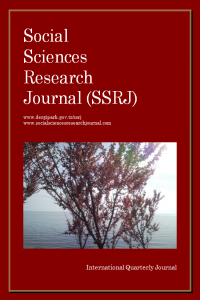Paternalistik Liderliğin Etkileşimli Yüzü Ve Örgüt Temelli Özsaygı Arasındaki İlişki
Paternalistik Liderlik, Yardımsever Liderlik, Otoriter Liderlik, Örgüt Temelli Öz Saygı
___
- Aiken, L. S. and West, S. G. (1991). Multiple Regression: Testing and Interpreting Interactions. Newbury Park, CA: Sage Publications.
- Aycan, Z., (2006) “Paternalism Towards Conceptual Refinement and Operationalization” Chapter 20, 445-466, Ch20.qxd.
- Aycan, Z. (2014) Paternalistic Leadership, Wiley Encyclopedia of Management, edited by Professor Sir Cary L Cooper.
- Baron, R. M., Kenny, D. A. (1986) “The Moderator-Mediator Variable Distinction in Social Psychological Research: Conceptual, Strategic, and Statistical Considerations”, Journal of Personality and Social Psychology, 51 (6), 1173 – 1182.
- Chan, S. C. H., Huang, X., Snape E., Lam C. L., (2013) “The Janus Face Of Paternalistic Leaders: Authoritarianism, Benevolence, Subordinates’ Organization-Based Self-Esteem, And Performance” Journal of Organizational Behavior, J. Organiz. Behav. 34, 108–128.
- Chan, S. C. H., (2014) “Paternalistic Leadership And Employee Voice: Does İnformation Sharing Matter?” Human Relations, Vol. 67(6), 667–693.
- Cheng B.-S. vd., (2004) ”Paternalistic Leadership And Subordinate Responses: Establishing A Leadership Model İn Chinese Organizations”, Asian Journal of Social Psychology 7, 89-117.
- Cheney, G.,(1983) “The Rhetoric of Identification and the Study of Organizational Communication”, Quarterly Journal of Speech, 69, 143-158.
- Chung Y. W., Yang J. Y., (2017) "The Mediating Effects of Organization-Based Self-Esteem For the Relationship Between Workplace Ostracism and Workplace Behaviors", Baltic Journal of Management, Vol. 12 Issue: 2, 255-270.
- Erez, M., Earley, P. C., (1993) Culture, Self-Identity, and Work, New York Oxford Unıversıty Press.
- Gao L., Janssen O., Shi K., (2011) “Leader Trust and Employee Voice: The Moderating Role of Empowering Leader Behaviors” , The Leadership Quarterly 22, 787–798.
- Gecas, V., (1982), “The Self-Concept”, Annual Review of Sociology, Vol. 8, 1-33.
- Lee B., Smith K., (1979) Psychosocıal Theorıes of The Self, Proceedings of a C;onference on New Approaches to the Self, held March 29-April 1, by the Center for Psychosocial Studies, Chicago, Illinois.
- Matzler K., Bauer F. A., Mooradian T. A., (2015) "Self-Esteem and Transformational Leadership", Journal of Managerial Psychology, Vol. 30 Issue: 7, 815-831.
- McClean, E. J., Burris, E. R., Detert, J. R. (2013), “When Does Voice Lead to Exit? It Depends on Leadership”, Academy of Management Journal, 56 (2), 525-548.
- Nourthouse P. G.,(2014), Liderlik, Kuram ve Uygulamalar, çeviri: Cengiz Şimşek, Çağlayan A.Ş., İzmir.
- Okan, T., Demir, H. & Bostan, S. (2017), Prosedür Adaleti Algısı Ve Örgütsel Vatandaşlık Davranışı-Birey İlişkisine Durumsal Bir Bakış: Yüksek Ve Düşük Psikolojik Sermaye Etkisi, UİİİD- International Journal of Economic and Administrative Studies, 2017 (18), 237-262.
- Pellegrini E. K., Scandura, T.A., (2008) “Paternalistic Leadership: A Review and Agenda for Future Research” Journal of Management, Vol. 34 No. 3, 566-593.
- Pierce J. L., Gardner D. G., Cummings L.L. and Dunham R.B., (1989)“Organization-Based Self-Esteem: Construct Definition, Measurement, And Validation”, Academy of Management Journal, Vol. 32. No. 3, 622-648.
- Sargut, S., (2015) “İşletme Kuram ve Pratik” içinde bölüm; Yönetim: Yapı ve Süreçler, editörler: Eryılmaz, M., Kaygusuz, S., Efil, İ., Ekin Yayınevi, Bursa.
- Shamir B., House R. J., ve Arthur M. B., (1993) “The Motivational Effects of Charismatic Leadership: A Self-Concept Based Theory” , Organization Science, Vol. 4, No. 4, 577-594.
- Stamper C.L., ve Masterson S.S.;(2002) Insider or Outsider? How Employee Perceptions of Insider Status Affect Their Work Behaviory” Journal of Organizational Behavior, 23, 875–894.
- Steers R. M., ve Mowday R. T., (1979) “Employee Turnover and Post-Decısıon Accommodation Processes” Technic Report No. 22.
- Zhang, Y., Huai, M.Y., Xie, Y. H. (2015) “Paternalistic Leadership and Employee Voice in China: A Dual Process Model”, The Leadership Quarterly, 26, 25–36.
- Yayın Aralığı: Yılda 4 Sayı
- Yayıncı: Denta Florya ADSM Limited Company
Alevî-Bektaşî Nefeslerinde Tevellâ ve Teberrâ
Ömer Faruk TEBER, Ramazan ÇALKAN
Kuram ve Uygulamada Tarihi Çevre Korumaya Bütüncül Bir Yaklaşım
Türkiye için Dış Ticaret Belirleyenleri: ARDL Sınır Testi Yaklaşımı
Prof.dr.özlem TAŞSEVEN, Prof.dr.nüket SARACEL, Dr.öğr.üyesi Naci YILMAZ
Metal Madencilik Faaliyetleri Arazi Edinim Süreci: Erzincan İli İliç İlçesi, Çöpler Altın Madeni
Sovyet Penceresinden 1956 Macar Ayaklanması: Batı Destekli Bir Karşıdevrim Girişimi
ISO 1000 İşletmelerinde Jenerik Stratejilerin Değerlendirilmesi
“Evinin Hanımı Çocuklarının Anası” Olan Kadının Kamusal Alan Mücadelesi
Osmanlı Devletinde Beledi Hizmetlerde Kurumsallaşma Süreci: Erken Dönem ve Tanzimat Yılları
Paternalistik Liderliğin Etkileşimli Yüzü Ve Örgüt Temelli Özsaygı Arasındaki İlişki
Ayşen Reyhan Wolff, Gizem Demir
İş Yüküne Çözüm Olarak Savcılık Soruşturma Bürolarında Toplam Kalite Yönetimi
